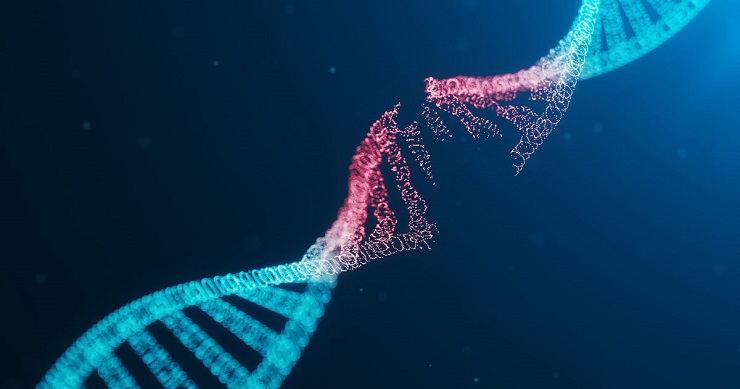Breaking the Code | How DNA Strand Breaks Accelerate Learning | Exploring the Surprising Role of Genomic Fractures in Enhancing Brain Plasticity
 In a paradigm-shifting discovery, researchers have uncovered that brain cells intentionally fracture their DNA strands as a means to rapidly express critical genes involved in learning and memory. Traditionally, double-strand breaks in DNA have been seen as ominous harbingers of cancer, aging, and neurodegeneration. However, emerging evidence reveals that these seemingly dangerous genetic events are harnessed by neurons to facilitate rapid responses during situations when speed is crucial for survival.
In a paradigm-shifting discovery, researchers have uncovered that brain cells intentionally fracture their DNA strands as a means to rapidly express critical genes involved in learning and memory. Traditionally, double-strand breaks in DNA have been seen as ominous harbingers of cancer, aging, and neurodegeneration. However, emerging evidence reveals that these seemingly dangerous genetic events are harnessed by neurons to facilitate rapid responses during situations when speed is crucial for survival.
The phenomenon challenges long-held assumptions about the static nature of the genome. Rather than being merely accidental damage, DNA strand breaks appear to serve a dual role: while they are linked to disease processes when uncontrolled, in a controlled context they unlock genetic potential. In the brain, where quick adaptation can mean the difference between life and death, the deliberate induction of these breaks helps neurons overcome the sluggish pace of traditional gene expression pathways by releasing enzymes bound along the DNA strands, thereby accelerating transcription.
Insights from the accompanying video emphasize this transformative role. As narrated, “to learn more quickly brain cells break their DNA” reflects a process where neuronal activity triggers targeted double-strand breaks near clusters of genes tied to synaptic function and memory. These breaks are not chaotic acts of destruction; instead, they are strategic maneuvers enabling an immediate burst of gene transcription. The video explains that such processes, once solely associated with negative outcomes like cancer, are now recognized as fundamental components of normal brain plasticity.
Delving deeper into the mechanism, the video transcript reveals that following the break, the site is tagged with an epigenetic marker—a methyl group—which further guides the cellular machinery in reassembling the genome. This two-step mechanism ensures that the initial burst of genetic expression is later fine-tuned by DNA repair processes, thus maintaining genomic integrity while still promoting rapid adaptation. This controlled cycle of breakage and repair allows the brain to respond efficiently to environmental stimuli without succumbing to the typical risks associated with DNA damage.
Beyond the immediate implications for learning, the discovery opens new avenues for understanding aging and disease. Researchers now speculate that dysregulation in this DNA-fracturing mechanism could underlie neurodegenerative disorders such as Alzheimer’s disease or even contribute to the development of glial cancers. The prospect that a mechanism once viewed solely as detrimental is instead a key regulatory process challenges scientists to rethink strategies for targeting genomic stability in therapeutic contexts.
Supplementary research from leading institutions underscores the broader significance of these findings. Studies from prestigious laboratories have observed similar patterns of controlled DNA damage and repair in other cell types, suggesting that this dynamic approach to gene regulation may be a widespread biological strategy. These insights not only enrich our understanding of neural function but also hold promise for developing innovative treatments that could harness or modulate this process to combat a range of diseases.
Ultimately, this evolving view of the genome as a dynamic, responsive entity rather than a fixed blueprint heralds a new era in neuroscience. The idea that breaking DNA might be an integral part of learning and memory redefines how we perceive genetic “damage.” By embracing this fluid perspective, we may soon uncover more about the brain’s remarkable capacity for adaptation and resilience, potentially leading to breakthroughs that benefit not just cognitive science, but medicine as a whole.
Key Takeaways:
- Rapid Adaptation: Neurons deliberately induce double-strand DNA breaks to swiftly activate genes critical for learning and memory.
- Controlled Mechanism: Despite being traditionally associated with disease, these genomic fractures are carefully regulated through epigenetic markers and efficient repair processes.
- Broader Implications: This dynamic process offers promising insights into aging, neurodegeneration, and potential therapeutic strategies.
“Whenever you’re utilizing that DNA template, you disturb the template, you change the template—and that’s not necessarily a bad thing.”
If you’re passionate about exploring the frontiers of neuroscience and its intersection with genomic dynamics, dive deeper into this revolutionary research. Explore more articles and videos on SpeciesUniverse.com to join the conversation and stay informed about how these groundbreaking discoveries might shape the future of medicine and our understanding of life itself.
More details: here
References:
- Wired (Website)
- Science and tech news (YouTube Channel)

Leave a Reply